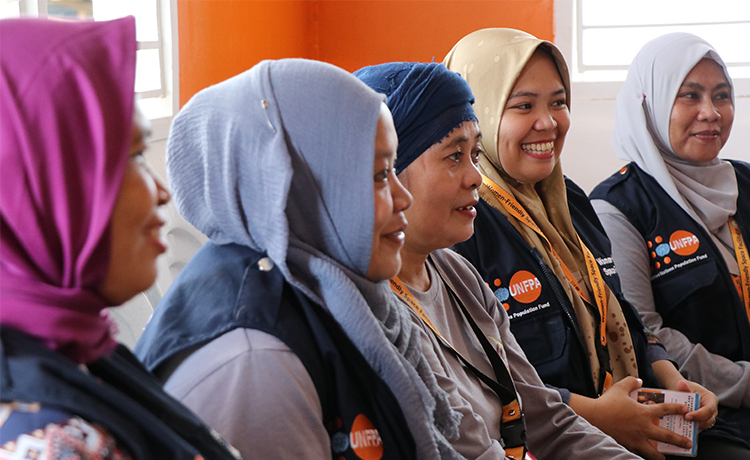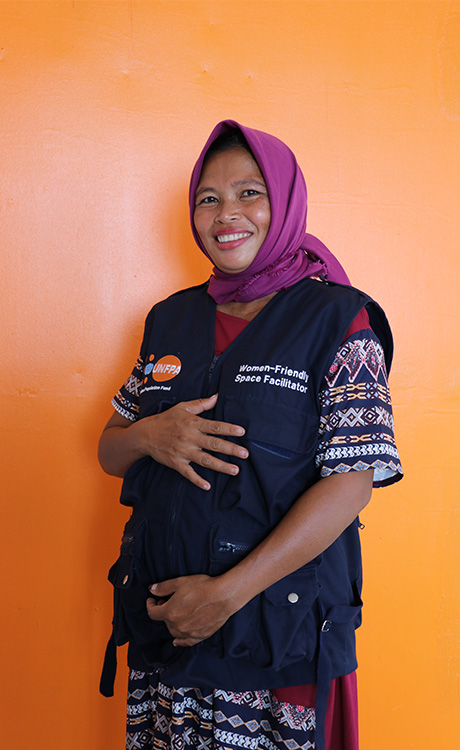News
Smoothing rough roads to reproductive health services in the Philippines
- 23 October 2023
News
GUINDULUNGAN, The Philippines – For many members of the indigenous Teduray tribe residing in the southern Philippines, going to the doctor means gearing up for a major journey.
From the hilly village of Ahan, it takes between four and seven hours to reach the nearest health clinic in Guindulungan. Walking takes the longest, but travelling by motorcycle costs $2.50 – an expense many cannot spare.
The Bangsamoro Autonomous Region in Muslim Mindanao (BARMM), in which the health centre is located, is the Philippines’ poorest. It’s also a place where women and girls are in significant need of sexual and reproductive health services. One in five married women there has an unmet need for family planning, and just two in five births occur at a health facility.
Cost and distance get in the way of access. But community members turned health facilitators have stepped up to bridge the divide.
Forty-year-old Merlyn Tresero serves as one such link between her Teduray neighbours in Ahan and the information, services and opportunities for growth and empowerment her community needs.
“We are able to help a lot of people,” she said. “And people from our communities love us back because of that.”

Women-friendly spaces
Ms. Tresero is one of 75 people to have been trained to run community-based activities at five women-friendly spaces that have been constructed across the southern Philippines, and to help her community access sexual and reproductive health services.
In their previous form, the women-friendly spaces were tents set up with support from UNFPA, the UN sexual and reproductive health agency, in the aftermath of humanitarian emergencies. The region where Ms. Tresoro lives is prone to both conflict and natural disasters – which drive high levels of displacement.
Today’s women-friendly spaces, though, are being built to last. “This is the first time that they are made of concrete,” said Bai Masla Beng Campiao, a coordinator for the Mindanao Organization for Social and Economic Progress, one of UNFPA’s implementing partners.
The women-friendly spaces offer women and young people, especially those who have been displaced, a place to gather and discuss the challenges they face and to learn about their rights. The spaces could also one day serve as communal kitchens or halfway houses for pregnant women travelling long distances to seek health services.
For Ms. Tresero, the nearest women-friendly space is in Guindulungan, a short distance from the rural health centre. She heads there every month for coaching and mentoring sessions.
Her experience, she said, has brought her confidence and a new community.
Commenting on the facilitators’ development, Ms. Campiao said: “We know that [the province] experiences all sorts of disasters, human-made calamities and conflict. Through this project, facilitators learn to be resilient and to not be fully dependent on their husbands”.

A local celebrity
The training Ms. Tresero received through the UNFPA project has empowered her to become a connector between her community and critical sexual and reproductive health services.
“We were taught how to encourage pregnant women in our communities to consult with doctors,” she said. “We were also taught how to deal with cases of gender-based violence and to help raise awareness about it.”
In one instance, a 17-year-old girl came to Ms. Tresero to report the abuse she was experiencing perpetrated by her 19-year-old husband. Ms. Tresero invited the couple to her home to discuss the repercussions of violence against women and children – and why it should not be tolerated.
With this vocal and visible role in the village, Ms. Tresero – who was eight months pregnant at the time of this interview – has become a popular person.
“When I walk around my community, people greet me and ask me to visit them and update them about important things happening at the health centre,” she said. “They ask me when I will visit the rural health centre or to remind them of their prenatal schedules.”
“I sometimes feel like I am a celebrity because everyone wants to talk to me,” she joked.